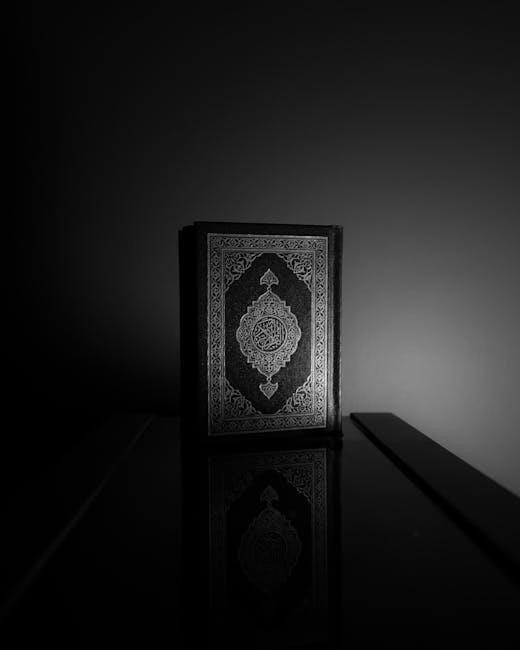
Julie Otsuka’s When the Emperor Was Divine is a poignant novel exploring the internment of Japanese Americans during WWII, offering a haunting yet resilient family saga.
1.1 Overview of the Book
When the Emperor Was Divine by Julie Otsuka is a haunting and evocative novel that explores the internment of a Japanese American family during World War II. The book delves into their harrowing experience, capturing the emotional and psychological impact of forced relocation. With a spare yet powerful narrative, Otsuka vividly portrays the family’s struggle to maintain dignity and hope amidst loss. The novel is both a personal story and a broader reflection on identity, resilience, and the injustices of wartime America, resonating deeply with readers seeking historical insight and emotional depth.
1.2 Historical Context of Japanese American Internment
During World War II, over 120,000 Japanese Americans were forcibly interned in camps following Executive Order 9066. This action, driven by wartime fear and racism, uprooted families, separating them from their homes and livelihoods. The internment camps, often harsh and poorly equipped, caused significant emotional and economic hardship. The novel sheds light on this unjust chapter in American history, highlighting the resilience of those who endured such treatment and the lasting impact on their lives and identity. The book serves as a powerful reminder of the consequences of fear and discrimination.

Plot and Structure of the Novel
When the Emperor Was Divine follows a Japanese American family’s journey during WWII, exploring their forced internment and emotional struggles through a fragmented yet cohesive narrative structure.
2.1 The Story of a Japanese American Family
When the Emperor Was Divine centers on a Japanese American family forcibly relocated from Berkeley in 1942. The narrative captures their emotional journey, from the daughter’s new glasses symbolizing clarity to the family’s resilience amid internment. The story explores their displacement, loss, and struggle to maintain identity. Through vivid imagery and subtle detail, Otsuka portrays the family’s quiet strength and the profound impact of historical events on their lives, creating a deeply human and relatable account of wartime hardship. The novel’s focus on their collective and individual experiences underscores the broader implications of internment.
2.2 Key Events and Turning Points
The novel recounts the family’s forced relocation from Berkeley to an internment camp, a pivotal moment in their lives. The daughter’s new glasses symbolize her newfound clarity, while the son’s absence and the father’s imprisonment highlight the family’s fragmentation. Life in the camp introduces harsh realities, yet the family’s resilience shines through. These events underscore the emotional and psychological toll of displacement, marking turning points in their struggle to maintain dignity and identity amidst profound loss. The narrative captures the gravity of these moments with lyrical precision.
Themes Explored in the Book
The novel explores themes of identity, loss, and resilience, while highlighting the quest for historical justice and the power of memory in preserving cultural heritage.
3.1 Identity and Belonging
The novel delves into the struggle of Japanese Americans to maintain their cultural identity amidst forced assimilation and internment. The characters grapple with dual identities, caught between their Japanese heritage and American nationality. This internal conflict is exacerbated by the harsh realities of displacement, leading to a profound exploration of belonging and selfhood. Otsuka’s prose captures the emotional turmoil as individuals question their place in a society that rejects them, highlighting the fragility of identity during wartime.
3.2 Loss and Resilience
The novel vividly portrays the emotional and physical losses endured by a Japanese American family during WWII internment. Displacement, separation, and the erosion of their former lives evoke profound sorrow. Yet, amidst this hardship, resilience emerges through quiet strength, familial bonds, and the hope of rebuilding. Otsuka’s narrative captures the delicate balance between grief and endurance, illustrating how individuals find ways to adapt and survive even in the face of overwhelming loss, ultimately revealing the human spirit’s capacity for resilience.
3.3 Historical Justice and Memory
Julie Otsuka’s When the Emperor Was Divine sheds light on the injustices of Japanese American internment during WWII, urging readers to reflect on historical memory. The novel highlights the long-lasting emotional scars and the struggle for justice faced by those forcibly relocated. Through its poignant narrative, Otsuka ensures that the voices of the past are not forgotten, fostering a deeper understanding of this dark chapter in American history. The book serves as a powerful reminder of the importance of acknowledging and learning from historical injustices to prevent their repetition.

Author Background: Julie Otsuka
Julie Otsuka is an award-winning novelist known for her lyrical prose and nuanced storytelling. Her work often explores themes of identity, history, and family legacy.
4.1 Biography and Writing Style
Julie Otsuka, an award-winning novelist, is known for her evocative and concise writing style. Her minimalist approach captures profound emotional depth, often exploring themes of identity, memory, and historical displacement. Born to a Japanese American family, her heritage deeply influences her work, particularly in When the Emperor Was Divine, which reflects her ancestors’ experiences. Otsuka’s prose is both poignant and precise, creating vivid narratives that resonate with readers long after the final page.
4.2 Awards and Recognition
Julie Otsuka’s When the Emperor Was Divine has received widespread critical acclaim and numerous awards. The novel was a finalist for the Discover Great New Writers Award and won the Alex Award from the American Library Association. Otsuka’s work has also been recognized with a Guggenheim Fellowship and the Asian American Literary Award. Her writing is celebrated for its emotional depth and haunting portrayal of the Japanese American internment experience, solidifying her reputation as a masterful storyteller in contemporary literature.

Availability of the Book in PDF Format
When the Emperor Was Divine is widely available in PDF format through various online platforms, including Blogspot and Internet Archive, for free or paid download options.
5.1 Sources for Downloading the PDF
The PDF version of When the Emperor Was Divine can be downloaded from various online sources, including Blogspot, Internet Archive, and other digital book platforms. Websites like cokbook21.blogspot.com and the Internet Archive provide free access to the novel in PDF format. Additionally, some platforms offer it as a text file or for online reading. Users can search these sites directly or use search engines to find reliable download links. Ensure to verify the authenticity of sources to avoid copyrighted material issues.
5.2 Legal and Ethical Considerations
Downloading When the Emperor Was Divine in PDF format must adhere to copyright laws. The novel, published by Anchor Books in 2003, is protected by copyright, and unauthorized downloads may infringe on these rights. Respect the author’s intellectual property by purchasing the book from authorized sellers or borrowing it from libraries. Ethically, supporting authors through legal purchases ensures fair compensation for their work. Avoid pirated copies to uphold ethical standards and promote a culture of respect for intellectual property. Always verify the legitimacy of download sources to avoid legal consequences.

Critical Reception and Reviews
When the Emperor Was Divine has received widespread acclaim for its evocative portrayal of Japanese American experiences during WWII, praised for its emotional depth and historical significance.
6.1 Major Reviews and Praise
Julie Otsuka’s When the Emperor Was Divine has garnered widespread critical acclaim for its powerful and poignant portrayal of Japanese American internment during WWII. Reviewers praise its sparse yet evocative prose, which vividly captures the emotional and psychological toll on families. The novel is often hailed as a masterpiece of historical fiction, offering a haunting yet resilient narrative. Critics highlight its ability to balance personal storytelling with broader historical context, making it a deeply moving and thought-provoking read. The book’s nuanced exploration of identity and loss resonates profoundly with readers.
6.2 Scholarly Analysis and Interpretations
Scholars have praised Julie Otsuka’s When the Emperor Was Divine for its nuanced exploration of identity, memory, and historical injustice. The novel’s sparse prose is often analyzed for its ability to convey the trauma and resilience of Japanese American families during internment. Academic critiques highlight its structure, which mirrors the fragmented nature of the characters’ experiences. The book is also celebrated for its contribution to historical memory, offering a deeply human perspective on a tragic episode in American history. Its themes of displacement and belonging resonate widely in scholarly discourse.
Cultural and Historical Significance
When the Emperor Was Divine sheds light on the forgotten chapter of Japanese American internment during WWII, humanizing the experience and raising awareness of historical injustices.
7.1 Portrayal of Japanese American Experience
Julie Otsuka’s When the Emperor Was Divine vividly portrays the Japanese American experience during WWII, capturing the harrowing journey of a family uprooted from their Berkeley home. The novel delves into the emotional and psychological toll of internment, highlighting themes of resilience and identity. Through poignant prose, Otsuka humanizes the experiences of over 120,000 Japanese Americans, offering a powerful exploration of displacement, loss, and the struggle to maintain cultural heritage in the face of historical injustices. This narrative provides a haunting yet essential glimpse into a often-overlooked chapter of American history.
7.2 Contribution to Historical Awareness
Julie Otsuka’s When the Emperor Was Divine significantly contributes to historical awareness by shedding light on the often-overlooked internment of Japanese Americans during WWII. The novel vividly portrays the emotional and cultural impact of this period, offering readers a deeply personal perspective on a tragic chapter of American history. By humanizing the experiences of those affected, the book fosters empathy and understanding, encouraging reflection on the past and its relevance to contemporary issues of identity, justice, and memory. It serves as a vital educational tool for exploring this historical injustice.
Educational Value of the Book
When the Emperor Was Divine is widely used in schools for its historical and emotional depth, teaching students about the Japanese American internment and fostering empathy through storytelling.
8.1 Use in Academic Curriculum
When the Emperor Was Divine is frequently incorporated into academic curricula to teach historical context, empathy, and critical thinking. Educators use the novel to explore themes of identity, resilience, and injustice, aligning with curriculum standards for history and literature. Its concise yet powerful narrative makes it an accessible resource for fostering discussions on diversity, equity, and inclusion. The book’s emotional depth and historical accuracy provide students with a compelling lens to examine the Japanese American internment and its broader societal implications.
8.2 Discussion Topics for Students
Discussion topics for When the Emperor Was Divine include analyzing the theme of identity amidst displacement, exploring the emotional impact of internment on family dynamics, and reflecting on the moral and ethical implications of historical injustices. Students can also examine how the novel portrays resilience and silence as coping mechanisms. Additionally, discussions can focus on the significance of the title, the role of memory in preserving history, and how the novel fosters empathy and understanding of marginalized experiences.
Julie Otsuka’s When the Emperor Was Divine poignantly captures a Japanese American family’s WWII internment experience, evoking themes of resilience and loss with historical depth.
9.1 Final Thoughts on the Book’s Impact
Julie Otsuka’s When the Emperor Was Divine leaves a profound impact by evoking the harrowing yet resilient experience of Japanese Americans during WWII. Its sparse yet powerful prose brings to light a often-forgotten chapter of history. The novel not only raises awareness about the injustices faced by Japanese Americans but also fosters empathy and reflection. Its emotional depth and historical significance make it a valuable resource for understanding this period. The book’s ability to resonate with readers ensures its lasting relevance in literature and education.

References and Further Reading
For more insights, visit this link or search Google Books for Julie Otsuka’s works. Additional resources are available on academic platforms and online archives.
10.1 Recommended Resources and Links
For further reading, access the full digital version of Julie Otsuka’s When the Emperor Was Divine or explore Google Books for excerpts; The Internet Archive also offers related materials. Additionally, academic platforms like JSTOR provide scholarly analyses. For more, visit Goodreads or check out Amazon for reviews and purchase options. Ensure to use legal and trusted sources for downloads.
